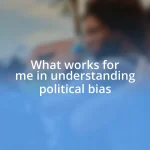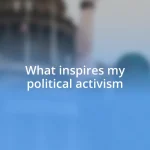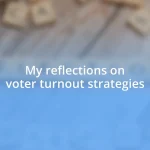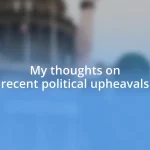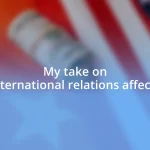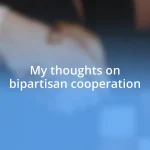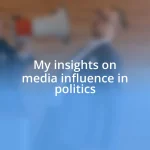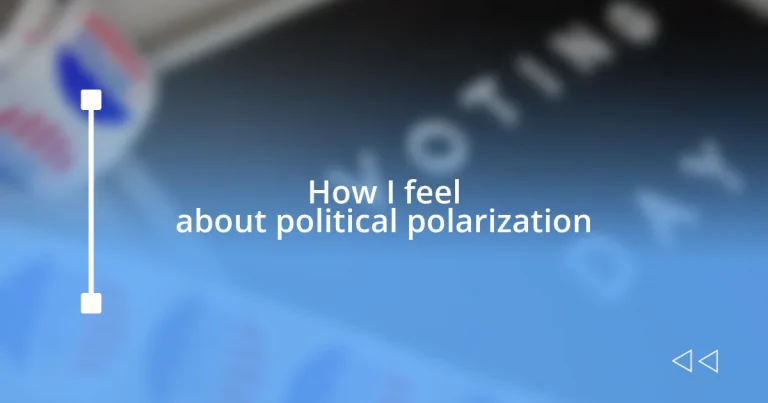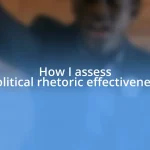Key takeaways:
- Political polarization creates division in personal relationships and discussions, often leading to anxiety and avoidance of differing views.
- The media and social media algorithms reinforce echo chambers, contributing to a breakdown in public discourse and a sense of isolation.
- Strategies like fostering open dialogue, seeking common ground, and sharing personal stories can help bridge divides and enhance understanding.
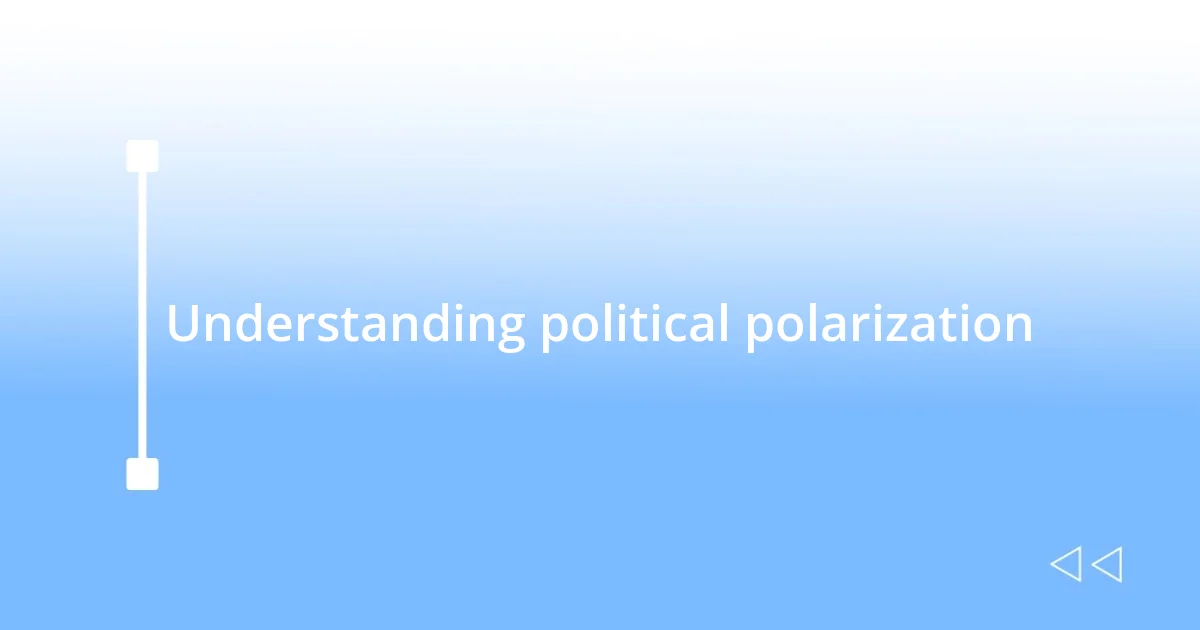
Understanding political polarization
Political polarization is like a widening chasm between two groups, each convinced of their own righteousness. I remember chatting with friends about recent elections, and it struck me how quickly casual conversations could spiral into heated debates—it’s exhausting and disheartening. Have you ever felt that shift from a lively discussion to a tense argument over beliefs?
The media plays a significant role in amplifying this divide. I often find myself scrolling through social media and noticing how algorithms feed us content that only reinforces our established views. It’s almost as if we’re living in separate realities, where diverse perspectives are drowned out by echo chambers, leaving little room for understanding. How can we bridge these gaps when we’re surrounded by voices that sound so different from our own?
This polarization not only affects our political landscape but also seeps into personal relationships. I once lost touch with a close friend because our differing political beliefs became too much to navigate. It made me reflect on how much we let politics define our connections. Is it possible, I wonder, for us to find common ground when our voices have become so segmented?
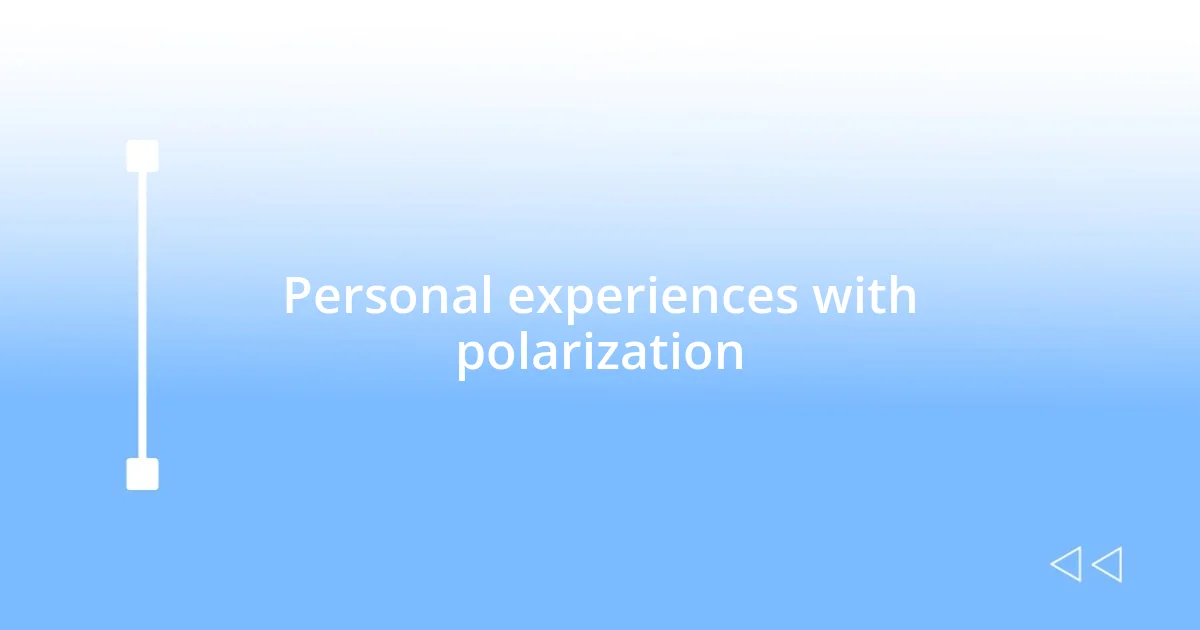
Personal experiences with polarization
Navigating political discussions lately has felt like walking a tightrope. I recall a family dinner where politics came up, and the atmosphere shifted instantly; I watched as my uncle and cousin exchanged frustrated remarks. It left me feeling a mix of sadness and frustration. It’s incredible how quickly love and laughter can turn into tension over differing views, reminding me that family bonds are often tested by these divides.
- I’ve experienced friends becoming distant over social media disagreements.
- I’ve witnessed people change their behavior or even avoid certain topics to keep peace.
- I often feel anxious about sharing my views, wondering how they might alter my relationships.
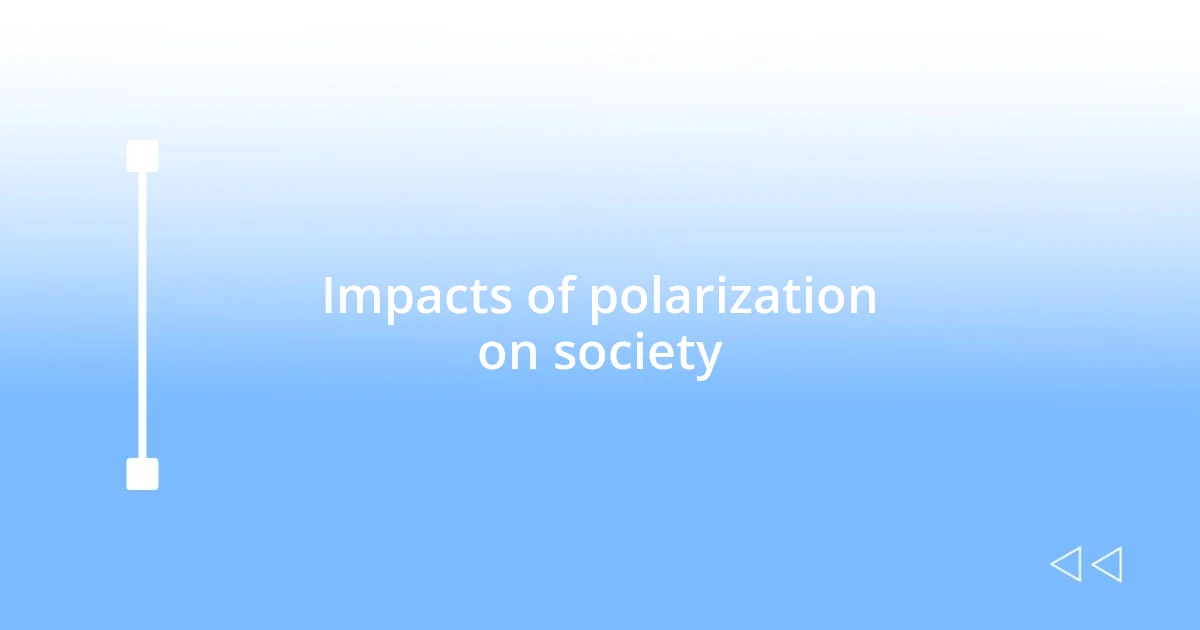
Impacts of polarization on society
The impacts of political polarization on society are profound and multifaceted. One notable effect is the deterioration of public discourse. I remember attending a community meeting where meaningful discussions were replaced with shouting matches. It struck me that we are not just disagreeing; we’re genuinely failing to communicate. How did our conversations become so combative?
Moreover, polarization fosters a sense of isolation. I once joined a local book club, excited to share different viewpoints on various topics. However, as it turned into a platform for political debates, I found myself withdrawing. This experience highlighted how polarization can create barriers, making it hard to connect even over shared interests. Have you ever feared discussing a favorite book because of what it might reveal about your political stance?
Lastly, the impacts extend beyond personal interactions; they affect our collective decision-making. In my experience volunteering for local initiatives, I observed how polarized views could halt progress. Different factions seemed more focused on winning arguments than finding solutions. It left me wondering how much we might accomplish if we prioritized collaboration over conflict.
| Impact | Personal Experience |
|---|---|
| Deterioration of public discourse | Community meeting devolving into shouting matches |
| Feelings of isolation | Withdrawing from discussions in book club |
| Stalled collective decision-making | Volunteer initiatives hindered by polarized views |
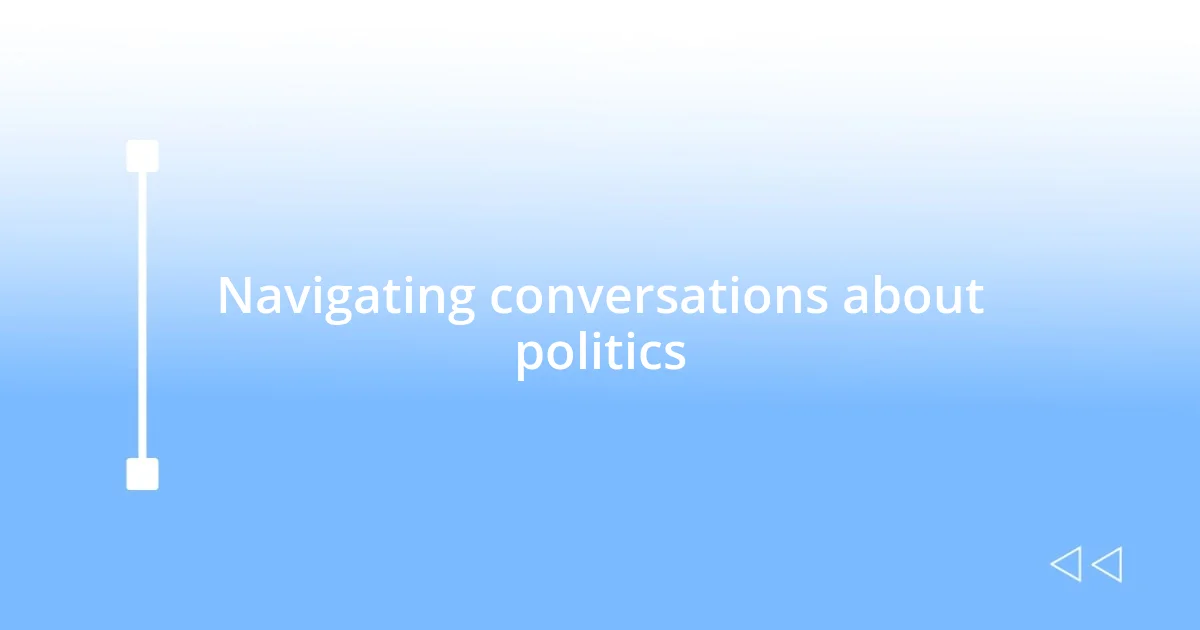
Navigating conversations about politics
When it comes to navigating conversations about politics, I often find myself choosing my words carefully, like I’m walking through a minefield. One evening at a friend’s gathering, I hesitated to share my perspective, worried it might ignite an unnecessary debate. I still remember the heaviness in the air as others stayed silent, each of us wrestling with our own thoughts on what we dare to say.
It’s fascinating, isn’t it? How we all approach political discussions differently. I’ve seen some people tackle these conversations head-on, believing in open dialogue as a way to bridge divides. Yet, during a recent coffee chat, a friend mentioned she avoids political topics altogether, fearing it could ruin her relationships. That moment made me ponder: are we sacrificing genuine connection for the sake of comfort?
I can’t help but wonder if we need to rethink how we engage in these discussions. Reflecting on my own experiences, I’ve discovered that understanding differing viewpoints can create a foundation of respect. After a heated exchange with a coworker over lunch, we both paused, took a breath, and shared why our beliefs mattered to us personally. That moment transformed our conversation from friction to understanding. Have you had a moment like that, where listening changed everything?
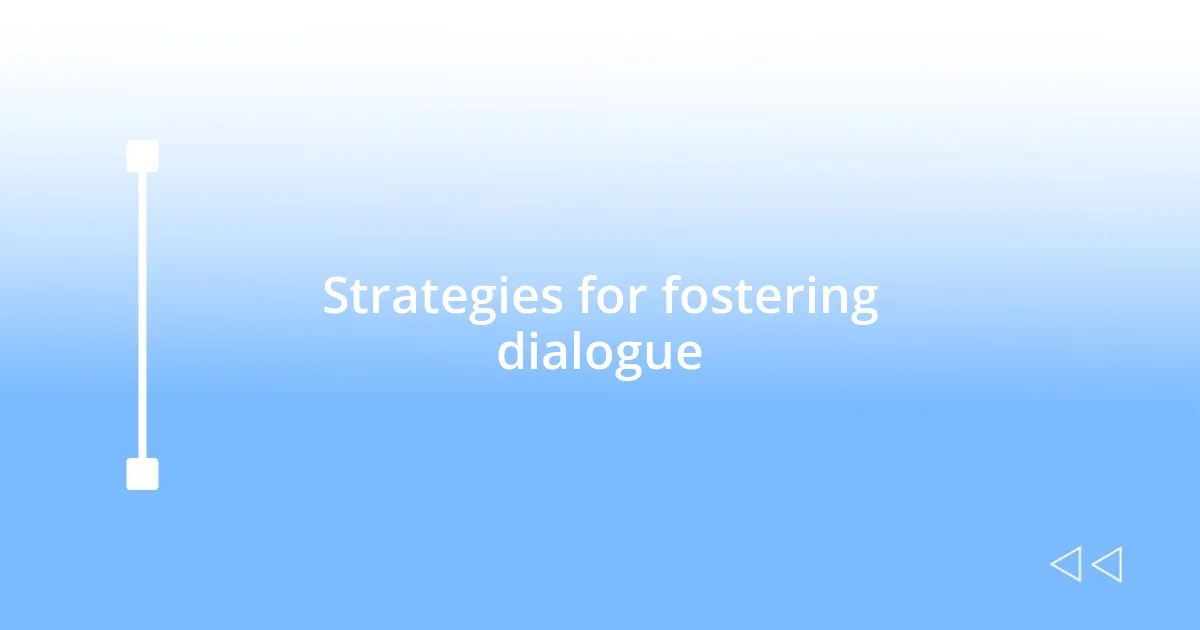
Strategies for fostering dialogue
It’s essential to create an environment where dialogue can flourish, especially when discussing contentious political issues. I remember a dinner party where the host encouraged open sharing by starting with ground rules. We each had the chance to express our thoughts without interruption, which shifted the atmosphere from tension to genuine curiosity. Have you ever noticed how important it is to feel safe in sharing your views?
Another effective strategy is to seek common ground before delving into disagreements. During a community workshop, I noticed how discussing shared community goals first allowed participants to ease into more challenging topics later. It was really enlightening to see how emphasizing our shared interests—like improving local parks—helped us respect differing opinions on broader political issues. Hasn’t everyone felt a little more connected when we focus on what unites us?
Lastly, I’ve found that asking open-ended questions can drive deeper understanding. At a family gathering, I experimented by asking, “What experiences shaped your political views?” This prompted stories that not only revealed motivations but also built empathy. It struck me how these conversations, grounded in personal experience, can dismantle polarization. How often do we pause to genuinely ask others about their perspectives?
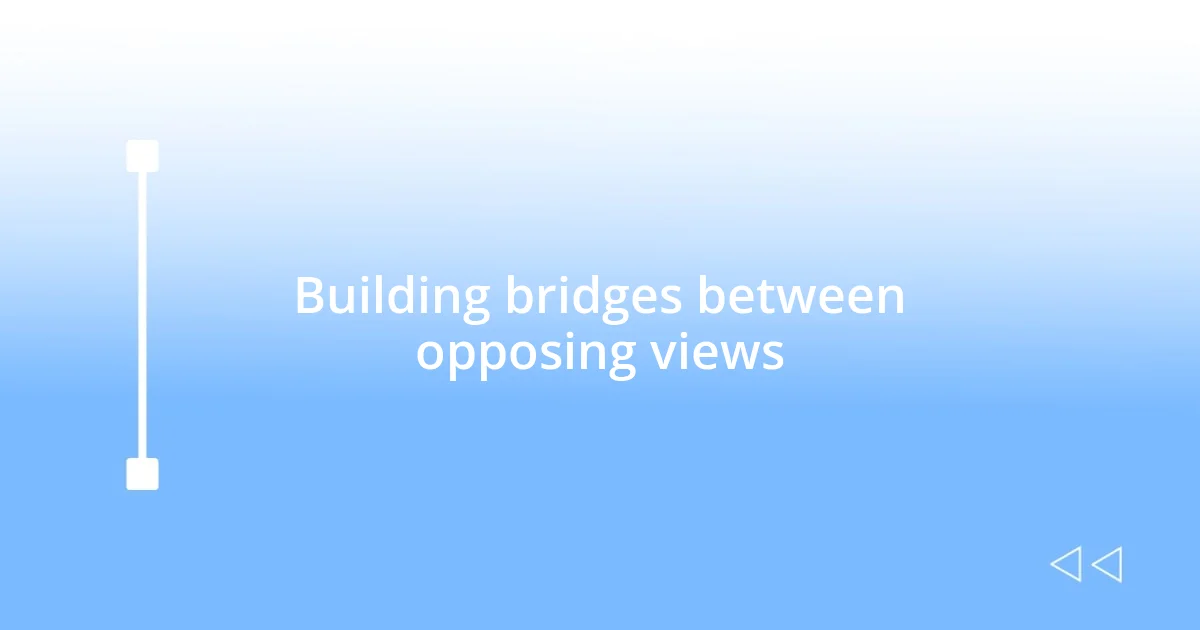
Building bridges between opposing views
Building bridges between opposing views often requires vulnerability and openness. I recall a discussion at a family reunion where I represented one viewpoint, and my uncle held the opposing one. Instead of arguing, we agreed to listen and understand where each of us was coming from. By sharing our individual stories, we found that our motivations were rooted in love for our families and our communities. Isn’t it interesting how personal experiences can humanize abstract political stances?
Sometimes, small gestures can make a big difference in bridging divides. I remember a time when I brought along snacks to a community meeting where differing opinions clashed. As we munched on homemade treats, tensions eased, and conversations flowed more freely. In that relaxed atmosphere, we began to discuss our hopes for the future rather than just our disagreements. Have you ever noticed how sharing food can create a sense of connection that transcends political labels?
Building bridges also means recognizing that change doesn’t happen overnight. Reflecting on a book club I participated in, we tackled a book that explored the lives of individuals from opposing political backgrounds. The discussions were rich and often emotional, pushing us to confront our biases. I left those meetings feeling not just informed but truly connected to people I once saw as “the other.” How often do we take the time to explore each other’s narratives, rather than just the headlines?
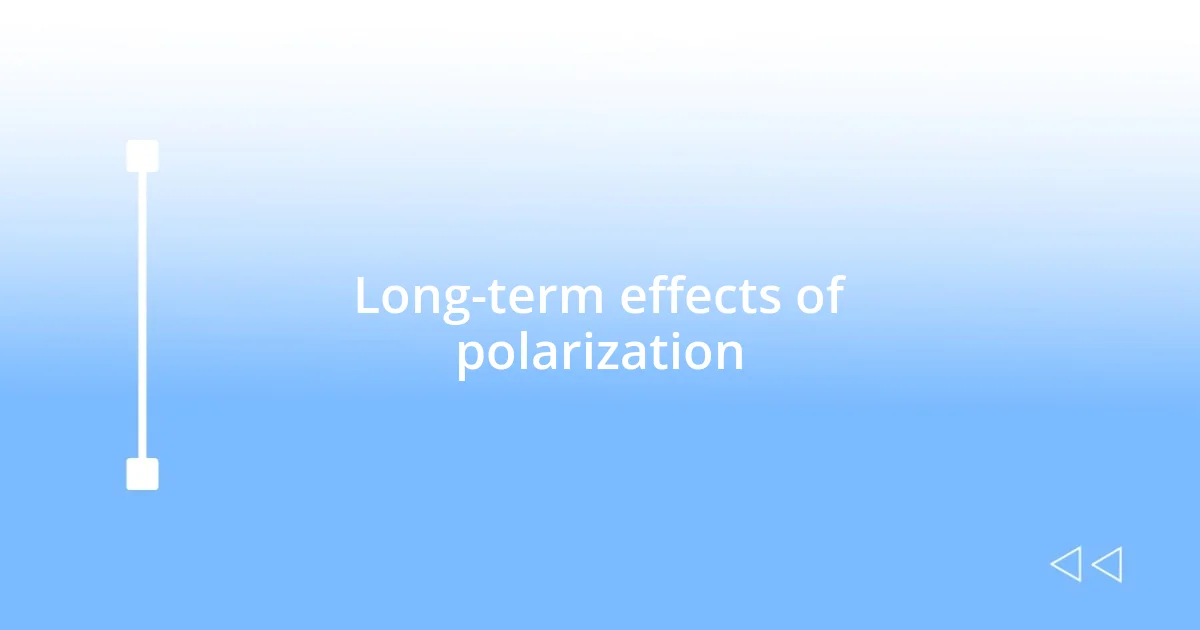
Long-term effects of polarization
The long-term effects of political polarization can be quite profound, impacting not just our political landscape but also our daily interactions. I remember a time when a friend and I sparked a playful debate over coffee that quickly turned tense due to a strong disagreement. Instead of laughing it off, I noticed how our exchanges became more defensive and less enjoyable. This experience really hit home for me—over time, if we allow these divides to deepen, friendships and communities can suffer, leaving us isolated in our echo chambers.
One significant consequence I’ve observed is the erosion of trust within our communities. At a local town hall meeting, I felt the palpable tension in the air, as neighbors who once held friendly conversations were now wary of one another. It’s disheartening, isn’t it? For me, this loss of trust not only diminishes the ability to work together for common goals but also breeds misunderstandings. I can’t help but wonder—how can we foster collaborative projects if we can’t even share a respectful dialogue?
Moreover, polarization seems to amplify mental health challenges among individuals. I’ve had friends express feelings of anxiety and stress relating to constant political strife on social media. It strikes me that when discussions become either extreme or combative, they can lead to increased isolation and dissatisfaction. Isn’t it crucial that we reflect on how our political climate affects our well-being and relationships? I truly believe that until we address these emotional aspects, we’ll continue to grapple with the wider implications of polarization in our lives.
